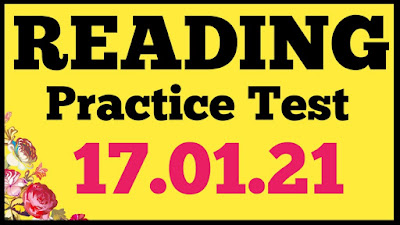IELTS READING PRACTICE TEST
This is the Latest(2021) Reading test for IELTS students and most of these two paragraphs are repeated in the previous exam of IELTS.
A not liar intelligence?
A. Emotional Intelligence as a theory was first brought to public attention by the book Emotional Intelligence, Why It Can Matter More Than IQ by Daniel Coleman, but the theory itself is, in fact, attributed to two Americans, John D. Mayer and Peter Salovey. What is emotional intelligence exactly? According to Coleman, Emotional Intelligence consists of five key elements. The first is knowing one’s own emotions: being able to recognise that one is emotional and having the ability to identify which emotion ls being experienced, even If it is not a particularly comfortable feeling to admit to, e.g. jealousy or envy.
B. Emotional awareness can then lead to managing one’s emotions, This Involves dealing with emotions, like jealousy, resentment, anger, etc., that one may have difficulty accepting by, perhaps, giving oneself comfort food, or doing nice things when one is feeling low. Many people do this instinctively by buying chocolate or treating themselves; others can wrap themselves in positive thoughts or “mother themselves”, There are, of course, ninny people who are incapable of doing this, and so need to be taught. The third area is self motivation. Our emotions can simultaneously empower and hinder us, so it is important to develop the ability to control them. Strategies can be learnt whereby emotions are set aside to be dealt with at a later date. For example, when dealing with the success or good fortune of others, it Is better not to suppress any “negative” emotion that arises. One just has to recognise it is there. And then one just needs to be extra careful when making decisions and not allow one’s emotions to cloud the issue, by letting them dictate how one functions with that person, The separation of logic and emotion is not easy when dealing with people,
C. As social beings, we need to be able to deal with other people which brings us to the next Item on Goleman’s list, namely: recognising emotions in other people. This means, in effect, having or developing “social radar”, i.e. learning to read the weather systems around individuals or groups of people. Obviously, loading on from this is the ability to handle a relationship, if we can recognise, understand and then deal with other people’s emotions, we can function better both socially and professionally. Not being tangible, emotions are difficult to analyse and quantify, compounded by the fact that each area. In the list above does not operate in isolation. Each of us has misread a friend’s or a colleague’s behaviour to us and other people. The classic example Is the shy person, categorised by some people as arrogant and distant and by others as lively and friendly and very personable. How can two different groups make a definitive analysis of someone that is so strikingly contradictory? And yet this happens daily in all our relationships – even to the point of misreading the behaviour of those close to us! In the work scenario, this can cost money. And so it makes economic sense for a business to be aware of it and develop strategies for employing people and dealing with their employees,
D. All common sense you might say. Goleman himself has even suggested that emotional intelligence is just a new way of describing competence; what some people might call savoir-faire or savior-vivre. Part of the problem here is that society or some parts of society have forgotten that these skills ever existed and have found the need to re-invent them. But the emergence of Emotional Intelligence as theory suggests that the family situations and other social interactions where social skills were honed in the past are fast disappearing so that people now sadly need to be re-skilled.
Questions 15-19
Choose one phrase (A-I) from the list of phrases to complete each key point below.
Write the appropriate letters (A-I) in Boxes 15-19 on your answer sheet.
The information in the completed sentences should be an accurate summary of the points made by the writer, There are more phrases (A-I) than sentences, so you will not need to use them all.
You may use each phrase once only.
Key point
15. Knowing one’s emotions …
16. One aspect of managing one’s emotions …



Comments
Post a Comment